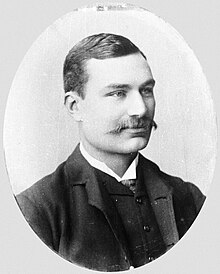Arthur Rhodes (politician)
|
The Honourable Arthur Rhodes OBE |
|
|---|---|

Rhodes in ca 1887
|
|
| Member of the New Zealand Parliament for Gladstone |
|
|
In office 1887 – 1890 |
|
| Preceded by | James Sutter |
| Succeeded by | electorate abolished |
| Member of the New Zealand Parliament for Geraldine |
|
|
In office 1890 – 1893 |
|
| Preceded by | Electorate in abeyance |
| Succeeded by | Electorate in abeyance |
| 24th Mayor of Christchurch | |
|
In office 1901–1902 |
|
| Preceded by | William Reece |
| Succeeded by | Henry Wigram |
| Personal details | |
| Born | 20 March 1859 The Levels near Timaru, New Zealand |
| Died | 26 December 1922 (aged 63) |
| Resting place | Bromley Cemetery, Christchurch |
| Nationality | New Zealand |
| Spouse(s) | Rose Moorhouse (m. 1892) |
| Relations |
George Rhodes (father) William Barnard Rhodes (uncle) Robert Heaton Rhodes (uncle) Heaton Rhodes (cousin) |
| Residence | Te Koraha |
Arthur Edgar Gravenor Rhodes OBE (20 March 1859 – 26 December 1922) was a New Zealand Member of Parliament and Mayor of Christchurch.
Rhodes was the son of George Rhodes. He was born on his father's station, The Levels, near Timaru. He received his education at Christ's College, Christchurch, where he captained the cricket and the football teams. He then attended Jesus College, Cambridge. He graduated with a BA and L.L.B. from the English college in 1880. He was called to the bar at the Inner Temple in 1882 and in the same year, he returned to New Zealand.
Rhodes founded his own legal firm in Christchurch in 1884. Later, Michael Godby and John Heaton Rhodes became partners and the firm was called 'Rhodes Ross'. Alan Fraser from Rangiora merged with the firm, from which 'Rhodes Godby and Fraser' resulted, later to be renamed 'Rhodes Fraser & Co'. Today, the firm trades as 'Rhodes & Co' in the Christchurch suburb of Addington.
Rhodes had a number of commercial interests. He was chairman of the New Zealand Shipping Company and chairman of The Press.
After Rhodes returned from his tertiary education in England, he purchased 9 acres (3.6 ha) of land in Merivale, setting himself up for having a family and demonstrating his ambitions. He called the property Te Koraha, which is Māori for 'the wilderness'. Development started in 1884, when he had cottages removed and stables and a coach house built. Construction of the homestead, designed by Armson, Collins and Harman, started in 1886. It was enlarged in 1894 and became a centre of the social life of Christchurch.
...
Wikipedia
